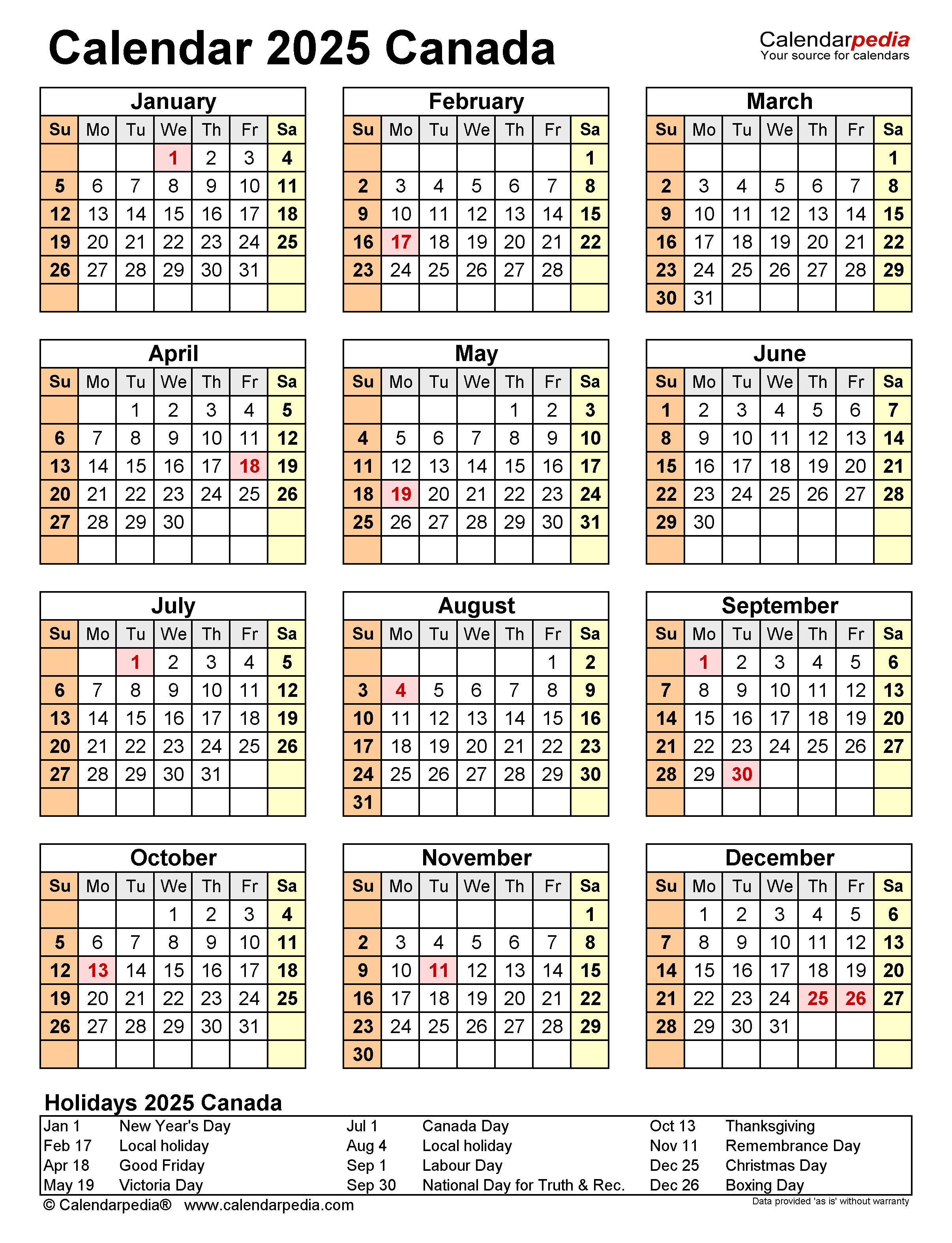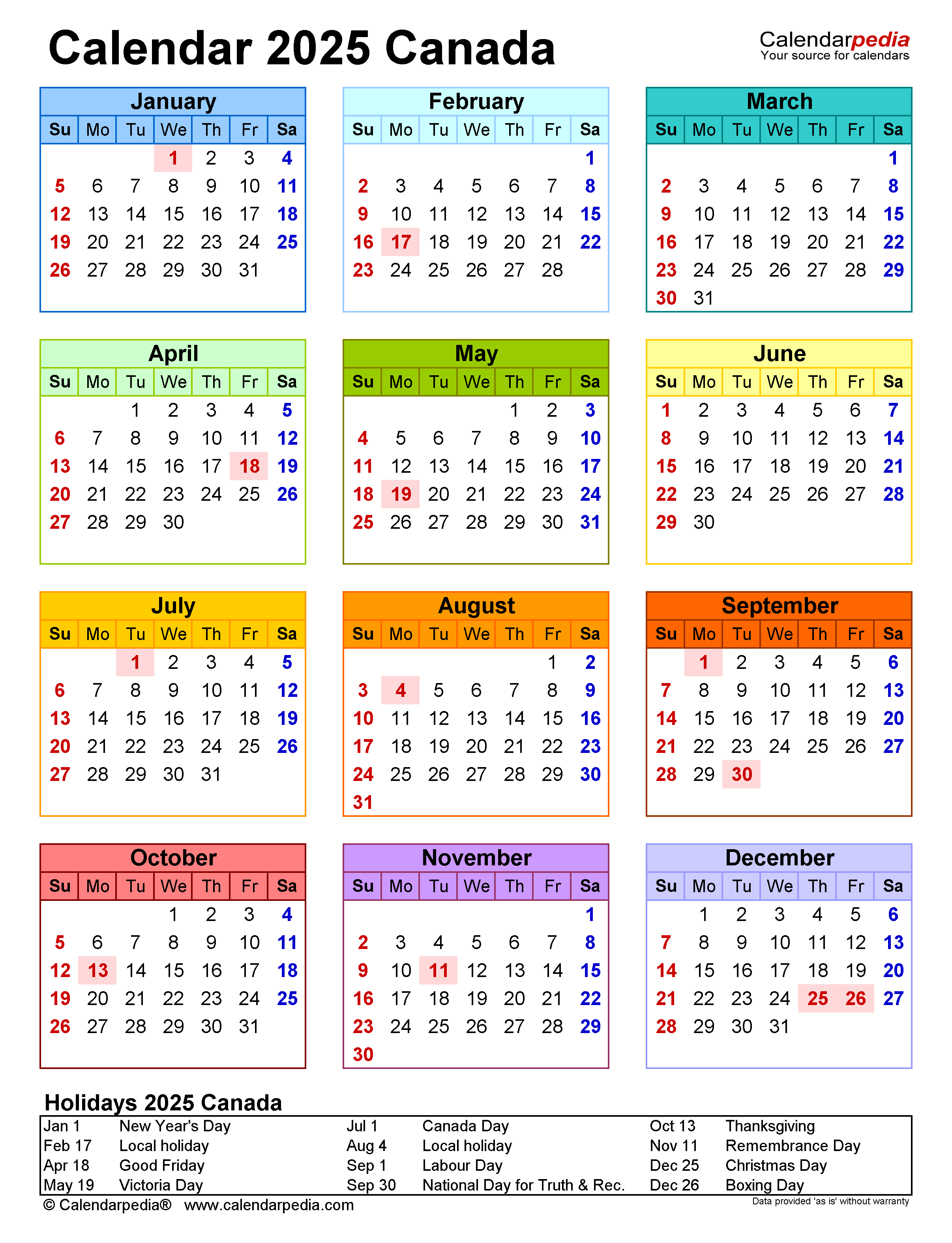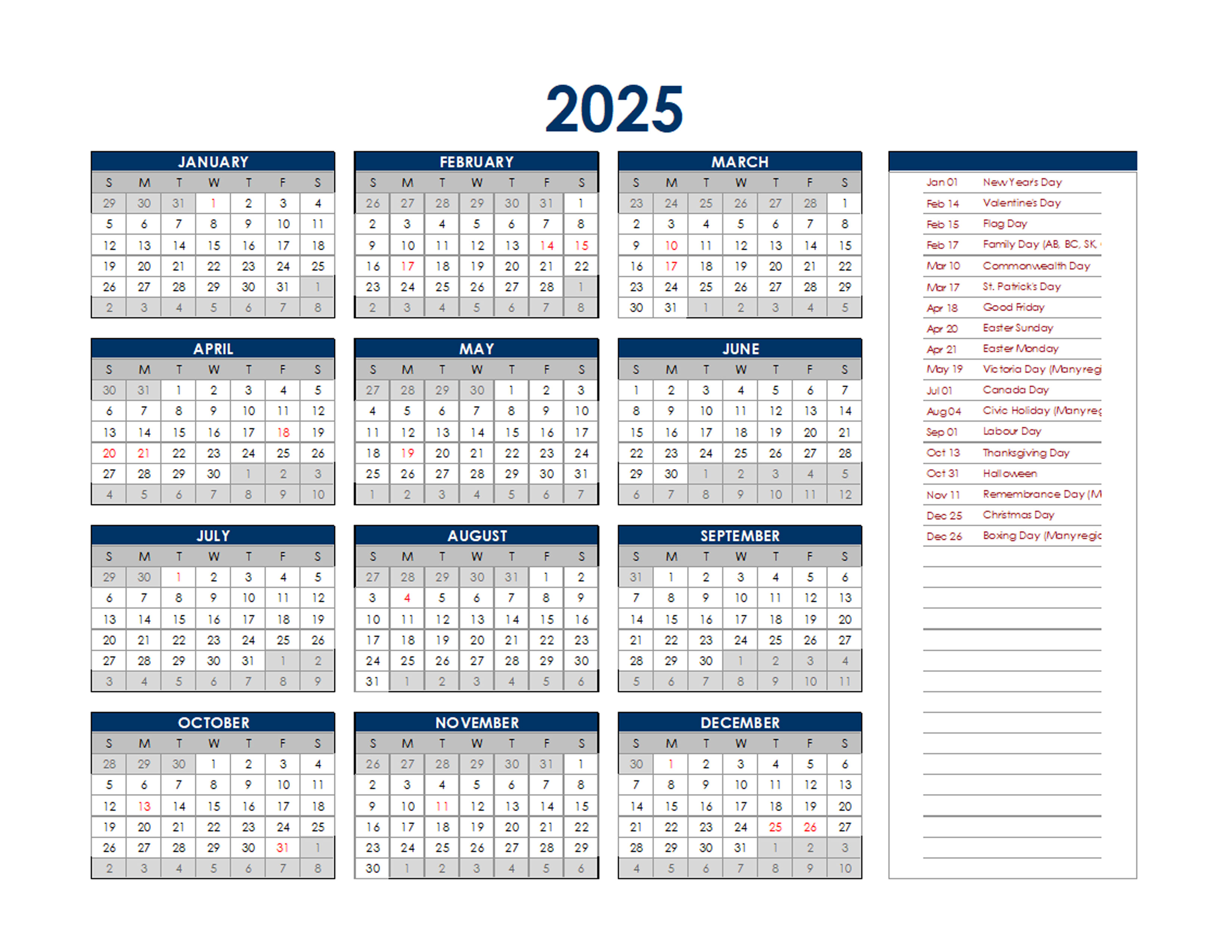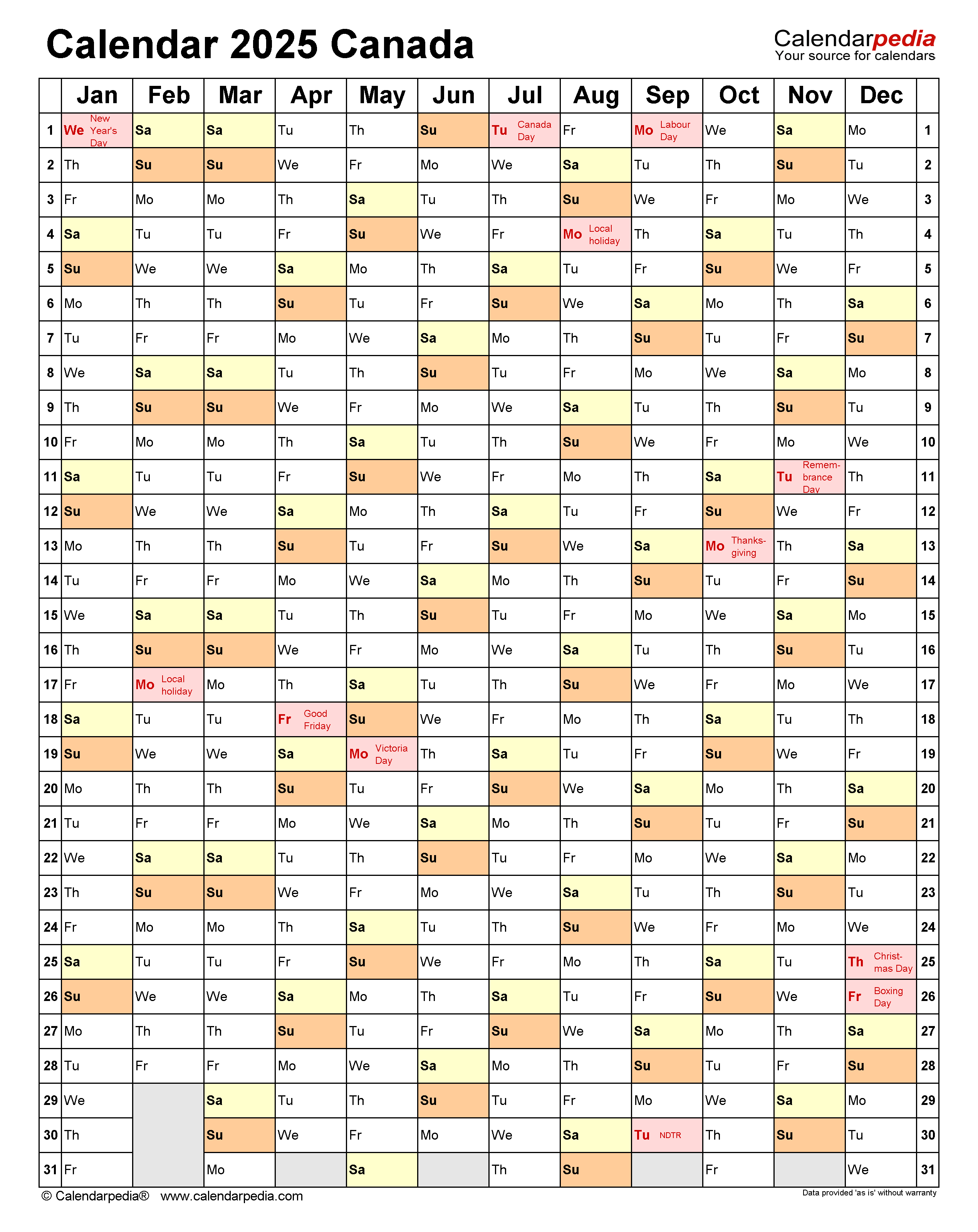A Comprehensive Guide to Canadian Holidays in 2025
Related Articles: A Comprehensive Guide to Canadian Holidays in 2025
Introduction
With great pleasure, we will explore the intriguing topic related to A Comprehensive Guide to Canadian Holidays in 2025. Let’s weave interesting information and offer fresh perspectives to the readers.
Table of Content
A Comprehensive Guide to Canadian Holidays in 2025

Canada, a nation renowned for its diverse cultural tapestry, celebrates a rich array of holidays throughout the year. These holidays, rooted in history, tradition, and cultural significance, provide opportunities for Canadians to commemorate important events, reflect on shared values, and enjoy time with loved ones.
This guide provides a comprehensive overview of Canadian holidays in 2025, outlining their dates, significance, and potential impact on daily life.
Statutory Holidays
Statutory holidays, also known as public holidays, are days recognized by law as non-working days. Most businesses and government offices are closed on these days, and employees are typically entitled to paid time off.
January
- New Year’s Day (January 1): This holiday marks the beginning of a new year and is a time for reflection, celebration, and setting new goals.
February
- Family Day (Third Monday in February): Celebrated in various provinces, this day emphasizes the importance of family and community bonds. It is a day for spending time with loved ones, participating in family-friendly activities, and reflecting on the role of family in society.
March
- St. Patrick’s Day (March 17): While not a statutory holiday in Canada, St. Patrick’s Day is widely celebrated, particularly in communities with Irish heritage. It is a day for parades, traditional music, green attire, and enjoying Irish cuisine.
April
-
Good Friday (April 10): This Christian holiday commemorates the crucifixion of Jesus Christ. It is observed as a day of reflection and solemnity, with many churches holding special services.
-
Easter Monday (April 14): This holiday follows Good Friday and marks the end of the Easter weekend. It is often celebrated with family gatherings and Easter egg hunts.
May
- Victoria Day (May 19): This holiday honors the birthday of Queen Victoria, who reigned over Canada from 1837 to 1901. It is a day for picnics, outdoor activities, and enjoying the arrival of spring.
June
- Canada Day (July 1): This national holiday celebrates the anniversary of the Canadian Confederation in 1867. It is a day for parades, fireworks, concerts, and other festivities that showcase Canadian pride and unity.
July
- Canada Day (July 1): This national holiday commemorates the anniversary of the Canadian Confederation in 1867. It is a day for parades, fireworks, concerts, and other festivities that showcase Canadian pride and unity.
August
- Civic Holiday (First Monday in August): This holiday, observed in various provinces, is a day to celebrate local communities and their achievements. It is often marked by parades, community events, and gatherings.
September
- Labour Day (First Monday in September): This holiday recognizes the contributions of workers and celebrates the achievements of the labor movement. It is a day for picnics, parades, and reflecting on the importance of fair working conditions.
October
- Thanksgiving Day (Second Monday in October): This holiday is a time to express gratitude for the bounty of the harvest and to celebrate the blessings of the past year. It is traditionally celebrated with family dinners and feasts.
November
- Remembrance Day (November 11): This day commemorates the sacrifices made by Canadians during wartime. It is a day for solemn reflection, remembrance ceremonies, and honoring veterans.
December
-
Christmas Day (December 25): This Christian holiday celebrates the birth of Jesus Christ. It is a time for family gatherings, gift-giving, and enjoying festive traditions.
-
Boxing Day (December 26): This holiday follows Christmas Day and is a traditional day for giving gifts to service workers and those in need. It is also a popular day for shopping and enjoying post-Christmas festivities.
Other Notable Holidays
While not statutory holidays, several other days are widely recognized and celebrated in Canada. These include:
-
New Year’s Eve (December 31): This day is often marked by parties, fireworks displays, and countdown celebrations.
-
Valentine’s Day (February 14): This day is a time to express love and affection to loved ones. It is celebrated with gifts, romantic dinners, and gestures of appreciation.
-
Halloween (October 31): This holiday is a time for costumes, trick-or-treating, and celebrating the spooky and supernatural.
-
Mother’s Day (Second Sunday in May): This day honors mothers and their contributions to society. It is celebrated with gifts, cards, and special meals.
-
Father’s Day (Third Sunday in June): This day honors fathers and their role in families. It is celebrated with gifts, cards, and special outings.
FAQs
1. What are the differences between statutory holidays and other holidays in Canada?
Statutory holidays are recognized by law as non-working days, while other holidays are not. Businesses and government offices are typically closed on statutory holidays, and employees are entitled to paid time off. Other holidays may be observed by certain businesses or organizations, but they are not legally mandated.
2. Are all statutory holidays observed in all provinces and territories?
Not all statutory holidays are observed in all provinces and territories. Some holidays, such as Family Day and Civic Holiday, are specific to certain regions. It is important to check local regulations for specific holiday observances.
3. What is the significance of Remembrance Day in Canada?
Remembrance Day is a solemn day of remembrance for Canadians who have died in wartime. It is a day for reflection, honoring veterans, and recognizing the sacrifices made for peace and freedom.
4. How are holidays celebrated in Canada?
Holidays in Canada are celebrated in a variety of ways, depending on the specific holiday and local traditions. Common celebrations include family gatherings, parades, concerts, fireworks displays, and special meals.
5. What are some tips for planning holiday travel in Canada?
When planning holiday travel in Canada, it is essential to consider the following:
-
Book accommodations and transportation in advance, especially during peak travel seasons.
-
Be aware of potential travel delays or disruptions due to weather or holiday traffic.
-
Check local regulations and restrictions related to COVID-19 or other health concerns.
-
Pack accordingly for the weather and activities planned.
Conclusion
Canadian holidays provide opportunities for reflection, celebration, and community engagement. They are a testament to the rich history, cultural diversity, and values that define Canada. By understanding the significance and observances of these holidays, Canadians can better appreciate their cultural heritage and participate in the traditions that make their nation unique.








Closure
Thus, we hope this article has provided valuable insights into A Comprehensive Guide to Canadian Holidays in 2025. We appreciate your attention to our article. See you in our next article!
